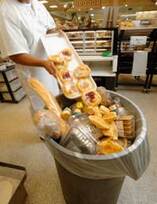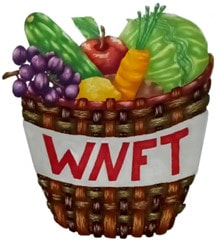 To quote Phoebe Buffay of Friends, "I'm very bendy." Well, I used to be. As a kid I could do the splits, put my feet behind my head, and rest my knees on my shoulders. Those days are long gone, but I still pride myself in my ability to bend, adapt, change, and grow. This year is testing everybody's resilience. Many people's body's can't adapt fast enough and millions people have died. Millions of jobs have been eliminated or put on hold, and supporting a family is a whole new ballgame with so many people suffering financial losses, food shortages, homelessness. The lucky minority has choices, support, the ability to shift direction and carry on, but most of us have been terrified. Waste Not Food Taxi is trying to be resilient. We stopped repackaging prepared food as a safety measure, and many of our volunteer drivers have been on hold since March 2020. Most of our donors were schools and restaurants, and when they closed, the need for our services almost dried up. At the same time, food shortages grew. Fast. We found access to additional food and have been distributing thousands of pounds to hundreds of families every week. This week, for the first time, we won't have food to distribute. It's not the end, though. It's not in my nature to ignore hunger. I feed people, one way or another. Always have, always will. We learned that the Oregon Food Bank had to suspend their Fresh Alliance program to divert resources to emergency food distribution. That's a good thing, but it left grocery stores having to throw away a lot of edible food. Other charities tried to step in, but major grocers are bound by an agreement with national food reclamation programs that require Oregon Food Bank to receive the donations. So, we met with Oregon Food Bank. We're going to work together to get those fresh food donations back into circulation while OFB continues to focus on transporting food throughout the state. Waste Not Food Taxi will use our network of volunteer drivers to pick up donations that OFB can no longer manage. We'll deliver them to OFB partner pantries and directly to recipients, primarily through partnerships with low-income housing. This will get donated food to people in need in a matter of minutes, instead of sending it from the grocer to the OFB warehouse to a pantry so a family can shop for it (on the days the pantry is open) thereby ending up with older, staler, and even rotten food. This is a whole new direction for us. It's huge, exciting, frightening, expensive, complicated, and undefined. Welcome to the post-pandemic world. We choose to take this opportunity to change for the better, because we can. Special thanks to Fred Meyer Raleigh Hills, Holly Tree Village, Whole Foods in the Pearl, and Bud Clark Commons, for being our first partners and helping us develop this program.
1 Comment
|
AuthorSusie Snortum is passionate about improving society's compassion for meeting basic human needs -- food, shelter, clean water, and dignity. Archives
September 2020
Categories |
We appreciate your support!
Hours
|
Telephone
|
Email
|
ADDRESS: 17850 NW Park View Blvd, Portland, OR 97229 United States

 RSS Feed
RSS Feed